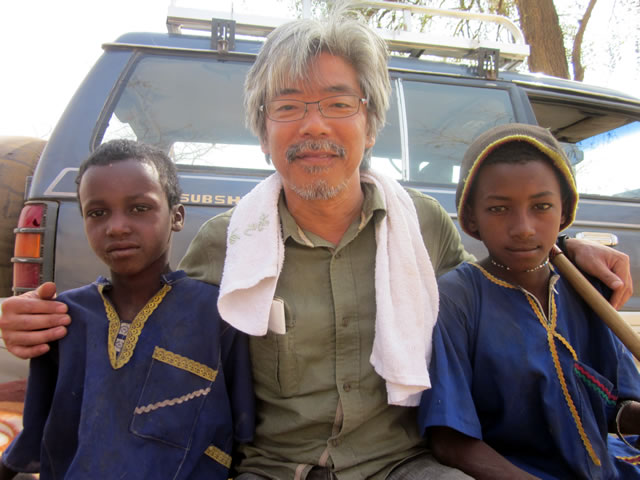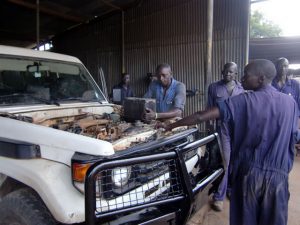
Hiroshi Taniyama, JVC’s President, on official trip to Sudan, neighboring to South Sudan. This photo was taken in 2011.
[Original by Hiroshi TANIYAMA, JVC’s President (July 21, 2016); Translated by Y. Nakamura]
Fierce battles happened in Juba, a capital of South Sudan, where Japanese Self-Defense Forces (SDF) were dispatched under United Nations Peacekeeping Operations (PKO). More than 270 persons have been killed in gun battles which started on the 7th of this month. It is said that the actual number of civilian casualties was more than that. It produced more than 40,000 refugees. Food shops were looted, and transportation of goods was stopped by inspection. They were worried about food shortage. Both opposing parties, president’s supporters and vice-president’s, issued an order of cease-fire. However, there is still some possibility of fights happening between both parties’ soldiers, or lootings occurring in the future, so the situation is unpredictable.
SDF was dispatched to South Sudan in line with PKO in 2008, responding to the end of the civil war between the North and the South of Sudan according to the peace agreement in 2005. They have been continuously stationed up to now, even after the independence of South Sudan in 2011. They had been assigned to reconstruction assistance, and their engineering unit had been engaged in such work as road construction. However, the government of South Sudan was divided and fell into civil war and confusion, producing as many as two and half million displaced persons and refugees. Even during those days SDF had been kept stationed in South Sudan.
South Sudan in the situation of real civil war
The government and anti-government forces made peace agreement, and peace was expected to come, but battles have not ceased yet. It is doubtful if leaders of both sides of government and anti-government have a real intention to achieve peace, since their intention seems not to have reached the rank and file. Although they made agreement to build united government of both sides, they had not decided on how their armies should be handled. Additionally, both armies contacted each other without any measures to control fierce hatred and apathy having been born in both sides. It might be considered as the reason why battles have sporadically happened.
The government and anti-government forces started fighting in Juba on July 7, and attacks frequently occurred in many places. It was such a confused situation that the government forces shot at residents who took refuge in a UN’s operating center for protection of displaced persons. Two Chinese Army’s soldiers dispatched to here for PKO were killed in confusion. Even though in such a situation of real civil war, SDF is continuing to be stationed.
Is there any inconsistency with PKO’s five principles?
In such kind of situation, we have to stop to think of how SDF should respond. SDF planned to have a new assignment of locally transporting Japanese residents, but they ultimately cancelled the land transportation. In coming autumn, there is the possibility of Kaketsuke-Keigo being ordered as a new assignment because security laws made it possible.
Is it really right that SDF is continuously staying in spite of this situation? Defense Minister Gen Nakatani said, “This situation is not applicable to armed conflicts.” He also declared that it was not a conflict but “an event of opening fire”. If it is considered only as an event of opening fire, we cannot help saying that he does not directly stare at the reality. In accordance with PKO’s five principles, once the situation fell into a state of conflict, SDF would have to withdraw. It cannot be helped that the government of Japan is supposed to distort the reality and interpret it to its own advantage. When watching a series of troubles, I remembered the puzzling statement of former Prime Minister Junichiro Koizumi saying “an area where SDF is doing activities is a noncombat area”.
There is a way other than PKO that Japan ought to choose

An automobile repair shop in Juba, which JVC assisted before the independence of South Sudan. It is now operated by South Sudanese mechanics and staff.
We cannot help saying that PKO would be considered an enemy and more likely attacked. If it tried to protect residents on the side of anti-government forces, it would bear a high risk of being considered an enemy by the government forces. It is such a dangerous situation that PKO itself has a possibility of falling into the party concerned in conflicts. It is impossible to solve problems by force, and they should not try to suppress the armed forces (according to circumstances fighting against the government forces), rather, they should mediate from a neutral position. Now, thinking of which way Japan ought to choose, I would like to say that Japan should not order SDF to go to the front, but instead they should mediate conflicts by making use of Japan’s peace brand.
Share This: